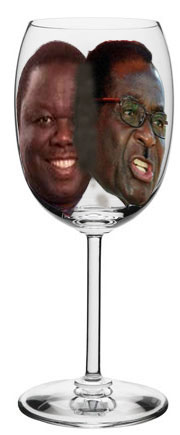Zimbabwe: Of Gravy, Cakes and Crooked Politicians

 |
| The Toast is Almost |
Already, order books for more gravy bowls seem full, what with Thabo Mbeki pushing for, according to ZimOnline reports, "power-sharing proposals [where] Tsvangirai becomes executive prime minister, while Mugabe remains president.... [with] at least two or three vice-presidents and two deputy prime ministers drawn from the three negotiating parties.... this structure was designed to accommodate Mugabe’s present vice-presidents Joseph Msika and Joyce Mujuru in addition to other top officials of the negotiating parties such as MDC second-in-command Thokozani Khupe and Emmerson Mnangagwa, a hawkish Mugabe's loyalist, who would become deputy prime ministers."
Now you tell me, by the time we are done with aides, deputies, secretaries, pa's, receptionists, drivers and messengers, Zimbabwe will have the biggest 'compromise government' in the history of political settlements. Mind you, the other six relatively 'unknown' fringe political parties are already screaming their lungs out for being left out of the show. The Federal Democratic Union, Progressive Union of Matebeleland, United People's Party, PUMA, ZANU Ndonga and Simba Makoni's Dawn/Mavambo/Kusile have made very little progress in upstaging Morgan Tsvangirayi in previous elections, but they are demanding to be heard, or more appropriately, to be fed!
My personal dislike of governments is not alien to liberal extremism. It is justified, because governments, especially African ones, specialise in legitimised plunder. My country has been under ZANUpf for almost thirty years, the last ten of which have seen very little of no industrial production - a vital component of tax revenue. Even with the best of intentions, a highly skilled workforce and superb balance of payments support, we can only hope to reach our economic sanity targets end of 2009.
In the intervening period, the prospect of a donor-driven public budget is real, considering that MDC made exciting committments to reverse collapsed infrastructure. Both Robert Mugabe and his chief banker, Gideon Gono, have driven our economy to complete bankruptcy. By my estimates, although Zimbabwe's vast mineral and tourist resources are the shot term weapons we have against an inevitable deludge of undesirable international indebtedness, I cannot see Tsvangirayi resisting the temptation to fund a huge budget deficit with external funds.
The lifecycle of a Zimbabwe GNU must be a lot shorter than its Kenyan counterpart mainly for two reasons. One, Zimbabweans want a perishable transitional arrangement that focuses on new institutions of governance and legislation to organise fresh presidential elections. Two, any mechanism that seems to give Mugabe a new lease of life is a national, regional and global liability that will slow Zimbabwe's admission into the brotherhood of nations. Maybe I am a natural pessimist. So far, Mr Odinga seems to be the acceptable face of Kenyan politics, but whether or not Mugabe can be overshadowed, even in a ceremonial presidential role, is a feat difficult to accomplish. Only time will tell.
